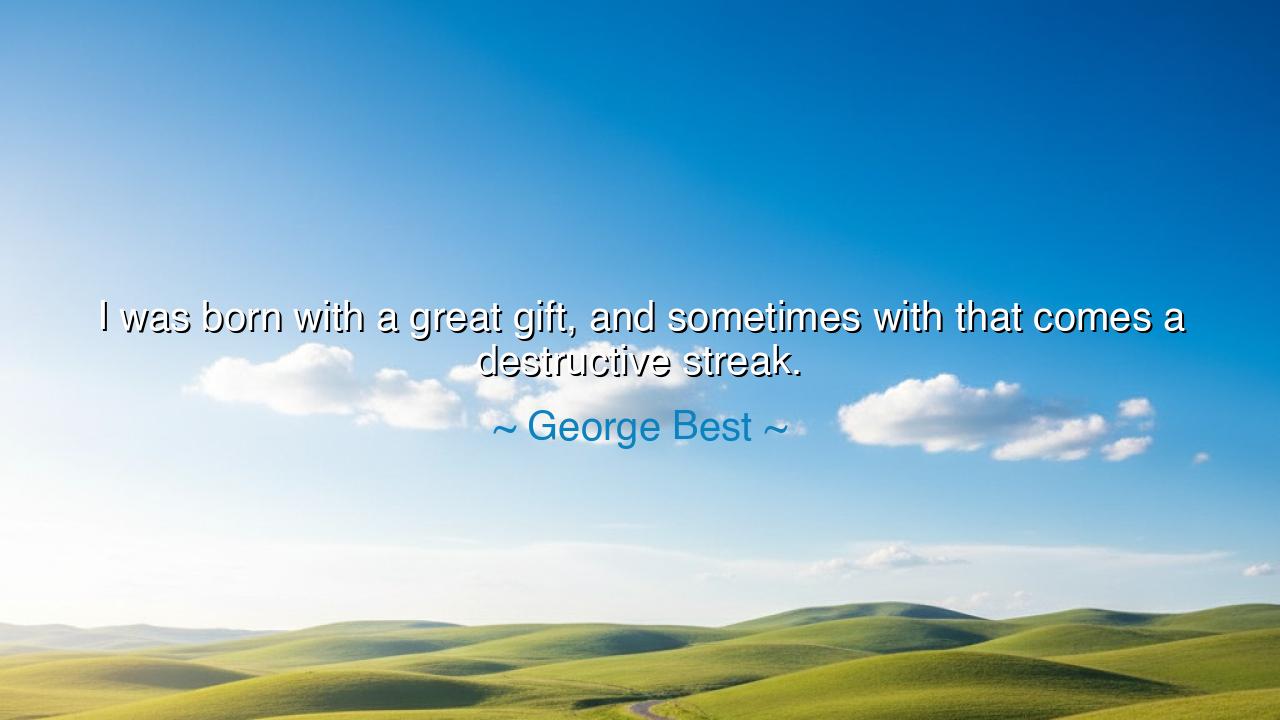
I was born with a great gift, and sometimes with that comes a






The legendary footballer George Best, once hailed as one of the greatest to ever touch a ball, confessed with haunting honesty: “I was born with a great gift, and sometimes with that comes a destructive streak.” In these words lies the eternal tragedy of human genius — that the flame which gives light also has the power to burn. Best’s voice, half-proud and half-penitent, speaks across time as a warning and a revelation: that talent, when not balanced by wisdom, becomes both a blessing and a burden. The ancients might have said that the gods, jealous of perfection, always place a shadow beside every gift.
Best was not merely a footballer; he was an artist of the field, a poet in motion. He danced through defenders as if carried by divine wind, his play not learned but born. Yet in the same breath that exalted him above others came a restlessness — a wildness that could not be tamed. He lived fast, shone bright, and fell hard. His gift lifted him to glory, but his destructive streak dragged him toward ruin. Thus, in his life, we see the ageless truth that greatness and fragility often dwell in the same soul, forever wrestling for mastery.
Throughout history, we have seen this duality — the divine fire and the consuming flame. Alexander the Great, conqueror of worlds, was driven by a relentless spirit that could not rest, even in victory. His genius built empires, but his inability to master himself hastened his end. Vincent van Gogh, whose art touched eternity, was torn by inner storms that no earthly praise could calm. George Best stands among these tragic figures: brilliant, radiant, yet undone by the very intensity that made him extraordinary. In each of them, the gift and the curse were not two separate forces, but two sides of the same divine coin.
There is a deeper wisdom in Best’s confession. To be “born with a great gift” is not simply to receive talent, but to inherit responsibility — the duty to guard one’s own fire. The destructive streak he spoke of is not an external enemy, but the shadow of one’s own light. When the heart is filled with passion, the line between creation and destruction grows thin. A man who can inspire millions can also destroy himself if he turns his power inward without discipline. The stronger the flame, the more careful the hand that must hold it.
Best’s story, though tinged with sorrow, should not be read as despair but as lesson. For his confession is not one of defeat but of recognition. He saw clearly what many never dare to face — that the battle of life is not only against the world, but against the chaos within. The destructive streak exists in all who burn brightly; the difference between ruin and triumph lies in whether one learns to master it. Self-awareness is the first act of redemption, and Best’s words, spoken near the twilight of his life, carry the humility of a man who has glimpsed both heaven and hell within his own heart.
Let us therefore learn from him. If you are born with a gift — whether of art, intellect, strength, or spirit — cherish it, but guard it well. Do not worship your gift, for it can turn upon you; do not hide it, for it withers in darkness. Instead, temper it with discipline, as a sword is tempered in fire. The world does not need brilliance that burns out, but light that endures. Remember that greatness is not measured by talent alone, but by the character that sustains it.
And so, dear listener, take these words as both caution and calling. For the divine spark within you can either illuminate your path or consume it. To possess a great gift is to walk upon sacred ground, where every step demands awareness. Like George Best, you may feel the wild pulse of creation beating in your veins — but unlike him, you have the power to channel it wisely. Build from your brilliance, do not be broken by it. For every gift is a test, and every flame, if mastered, becomes a light for the world.






AAdministratorAdministrator
Welcome, honored guests. Please leave a comment, we will respond soon